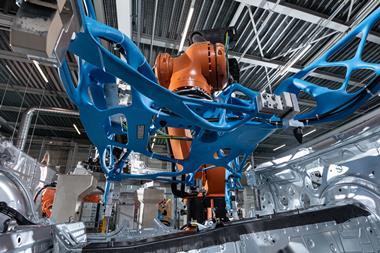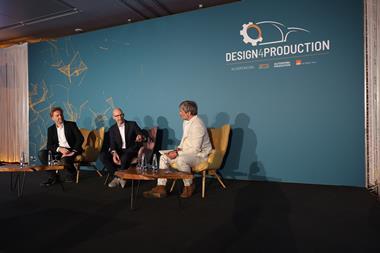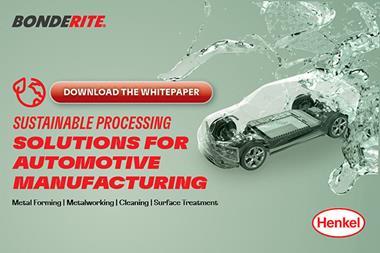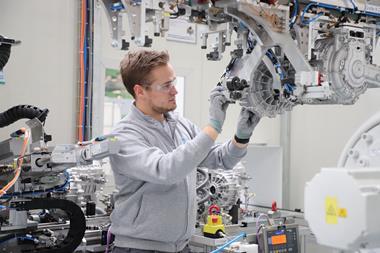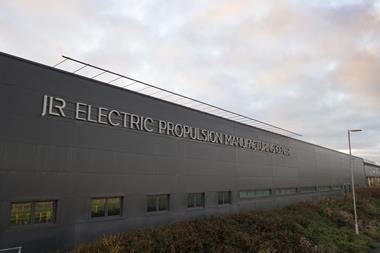Grinding, finishing and electrical discharge machining have gone from niche to mainstream manufacturing processes
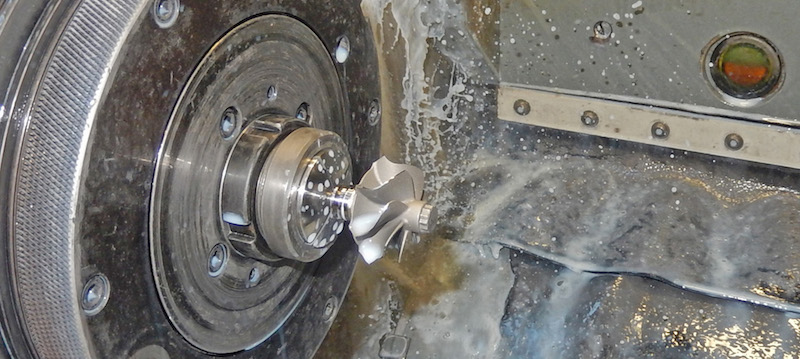 Once upon a time, machining processes such as grinding and electrical discharge machining (EDM) were viewed as ‘black art’ technologies. Today, however, these advanced machine shop methods have entered the mainstream, with the automotive industry among those benefitting most.
Once upon a time, machining processes such as grinding and electrical discharge machining (EDM) were viewed as ‘black art’ technologies. Today, however, these advanced machine shop methods have entered the mainstream, with the automotive industry among those benefitting most.
Take Erlson Precision Components, for example. Based in Skelmersdale, UK, the company’s 7,000 sq.m product development and production facility is the global centre for direct-to-line deliveries of machined, electron-beam welded and balanced turbocharger shaft and wheel rotor assemblies. Grinding to micron tolerances has become critical for the company’s business, particularly as it has production targets of 33,000 units a week for passenger cars and a further 2,000 a week for commercial vehicle and off-highway applications.
Sales at Erlson jumped 44% from £16m ($20m) in 2014-15 to £23m in 2015-16. To help meet the corresponding increase in production, Erlson has invested £2.7m over the past two years with a major focus on grinding capability. Here, <4µm tolerances are demanded on turboshafts with process capability (Cpk) maintained within 1.33. In total, 21 Toyoda cylindrical, angle-head and groove grinders have been installed by 2D CNC Machinery, with a further machine currently on order.
[sam_ad id=17 codes='true']
“Toyoda is our prime grinding machine builder because, in our case, high orders of machine versatility are important,” says director of technical services Mark Corns. “This allows us to easily reconfigure the basic machine for different applications or to meet process changes.”
Due to the number of machines installed, Erlson relies on 2D CNC to source the appropriate type of grinding machine from Toyoda, then re-engineer, recondition and load the specification to meet the demands of the process. For instance, the company has recently sourced an angle-head cylindrical grinding machine and is currently performing process capability trials ahead of installation.
Erlson produces three sizes (large, medium and small) of passenger-car turbocharger shaft and rotor assemblies, which can have up to 12 different combinations of shaft. For commercial vehicles there are five types using a common shaft and a different wheel rotor according to the intended use, which can be on engines up to 12.7 litres in capacity.
In line with the application and volume requirements, some grinding machines are standalone, with others configured into a cell featuring a shaft profile grinder, groove grinder and thread-rolling machine. For higher production demands, 2D CNC has specified and supplied automatic load and unload gantries that are fully integrated into the grinding process.
A high-level finish for high-load componentsAlong with turboshafts, another important grinding/finishing application in the automotive industry is the crankshaft, which is typically subjected to micro-finishing operations; these are not without challenges. By way of example, after evaluating statistics from its fleet network, a well-known truck manufacturer ascertained that an unacceptable percentage of reported crankshaft damage was occurring due to particularly high loads on the radii of the bearings. Working closely with German machine-tool manufacturer Thielenhaus Technologies, the truck-maker decided to perform finishing work on both the bearings and the transition radii.
In order to achieve the same surface quality on the crankshaft journals and radii, Thielenhaus developed a novel tape contact shoe. RadiusFlex shoe technology presses a finishing tape with a special profile on both sides into the radius, allowing radii to be machined up to 90° and representing a significant advance on the previous 60°. From this, the truck manufacturer’s goal was successfully achieved. The shoe systems can be integrated in Thielenhaus’s CrankStar machine platform, which features horizontal and vertical versions for machining passenger-car or truck crankshafts.
The pendulum approachAt another German machine tool manufacturer, Emag, recent breakthroughs include a pendulum grinding process for steering-gear applications. Components such as ballscrew nuts require a particular grinding method to create a perfect connection to the ballscrew spindle so that efficiency can be maximised.The VLC 250 PDS was developed specially at the request of a customer that wanted to grind ballscrew nuts. While one pick-up spindle removes a component from its particular infeed system and conveys it to the measuring probe, the second pick-up spindle is already in the machining area, conveying the ballscrew nut to the two grinding spindles (where the two-stage grinding process is performed).
So, what is the advantage of this pendulum grinding approach? The answer relates to the correct positioning of the workpiece in the machine: before the grinding process can begin, the inner contour of the component must be aligned to ensure that the spindle can be positioned at the end of the thread – a time-consuming process. In order to achieve this, a special timed system is deployed whereby the measuring or positioning of one workpiece is completed simultaneously with the machining of another, thus reducing unproductive idle time.
"In the automotive sector there seem to be many parts that demand deep ribs, typically 75-100mm – or 50mm for a blind rib – which provides a challenge when spark eroding" - Brett Mitchell, RP Technologies
Of course, not all grinding in the automotive sector is production grinding, as can be seen at FSG Tool & Die, based in Llantrisant, UK. FSG has recently installed a Perfect PFG80-150AHD cantilever-type surface grinder from RK International Machine Tools to assist the production of tooling.
As automotive tooling has become more complex in recent years, the size of die sets has increased. With this in mind, FSG Tool & Die recently reviewed its surface grinding capacity, looking to replace an extensively used machine with something that would bring the company up to date and provide greater capacity. Although the PFG80-150AHD is the smallest machine in Perfect’s cantilever range, it still comes with a table size of 800mm x 1,500mm, which covers the vast majority of work at FSG.
“The increase in table size is allowing us to work in different ways; to improve throughput and grind larger parts that would have previously gone out to subcontract suppliers,” says grinding team leader Simon Elliott. “Prior to placing the order we looked at a number of options before finalising our selection. The conversations we had with RK reassured us that they were not just selling a machine, but wanted to make sure we were getting the right solution for our needs.”
EDM: Down to the wireTool manufacture is also driving investment in the latest EDM technologies. Lynar Manufacturing of Harlow, UK, for example, has replaced an ageing wire erosion machine with a new Sodick VL600Q, a move that has seen the company double its cutting speed while simultaneously reducing wire consumption. The machine has been set to work producing press tools for lighting assembly brackets and other parts used on automotive trailers, everything from large articulated trucks down to 7.5-tonne vehicles.
“The new machine offers a five-times larger bed that is allowing us to produce bigger tools or manufacture multiple smaller components on a single work platform,” says tool and design manager Sean Murrells. “As a result, we can handle a more diverse range of projects, while making the process more efficient and cost-effective.”
When used for the commercial manufacture of punches and dies from tool steel, the machine typically cuts to within 10µm. However, in test cutting under controlled conditions, tolerances can be as fine as 2µm.
The story is similar at injection-moulding specialist RP Technologies, based in Kingswinford, UK, which is using its newly installed Sodick AD55L die sink EDM to reduce the time taken to produce deep ribs from days to just hours. Some 60% of the company’s quick-turnaround aluminium tools are destined for the automotive industry, everything from under-bonnet parts to interior components.
“In the automotive sector, there seem to be many parts that demand deep ribs, typically 75-100mm – or 50mm for a blind rib – which provides a challenge when spark eroding,” explains director Brett Mitchell. “Our new machine can produce ribs of this type in hours, rather than the days we had to endure previously. As everything is about time compression in the automotive arena, the investment has proved vital.”

A major steering component manufacturer was experiencing excessive scrap issues in the company’s critical worm-gear grinding operation; the plant simply could not meet the surface finish requirements requested by its customer. Moreover, a corporate mandate restricting chlorinated paraffin use in metalworking fluids was also issued. As a result, the plant turned to Quaker Chemical to develop a grinding fluid that could meet the required surface finish specifications and allow the company to adopt chlorine-free technology.
The team at Quaker analysed the challenges and developed QuakerCut 026 PEJ, a heavy-duty neat oil that contains a synthetic ester and a novel non-sulphurised and non-chlorinated extreme pressure additive. Trials using the customer’s Nachi worm-gear grinding machines side by side against the previous chlorinated neat oil showed that switching to the new grinding fluid achieved both objectives, saving the customer $240,000 a year in the process by reducing scrap.





























